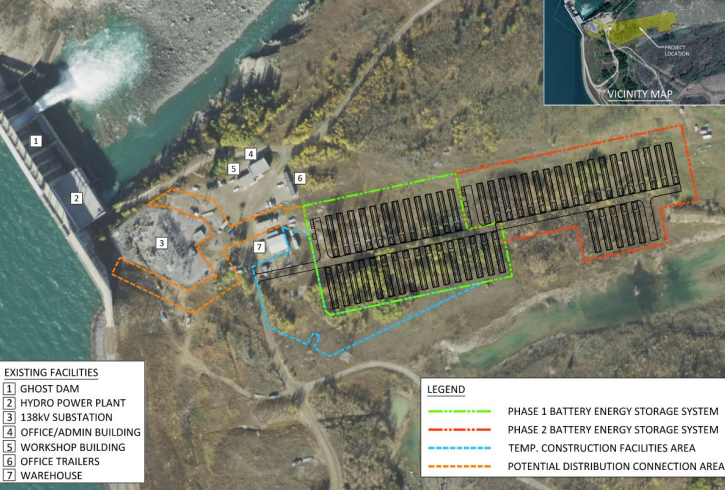TransAlta has officially submitted its application to the Alberta Utilities Commission (AUC) to build a battery storage facility at the Ghost Reservoir about 18 kilometres west of Cochrane in Rocky View County.
The WaterCharger Battery Storage Project, as it is officially known, has been in development for several years and would support Alberta's energy grid with a maximum power rating of 180 megawatts of electricity. Batteries would be charged with electricity from TransAlta's existing hydroelectric facility, stored at the proposed WaterCharger site and then rerouted into the provincial power grid as needed. If approved, the project would be one of the largest electricity storage facilities in the province.
Initially, the Calgary-based utility aimed to submit its application to the commission in December of 2021 but delayed the process to answer feedback from stakeholders. Some of the concerns TransAlta hoped to address included the risk of battery fires, leaching or leaking, as well as noise and construction concerns.
Of particular concern among stakeholders was the potential for battery fires, which can be caused if the lithium-ion batteries used in the facility malfunction. Battery-caused fires have occurred at similar facilities elsewhere in the world as recently as 2019.
In an update emailed to stakeholders on Dec. 22, TransAlta business development manager Chris Teare wrote, "safety is paramount to TransAlta, its employees and the communities in which we operate."
Teare said safety is a crucial factor in determining which type of batteries are used in the facility and the design and emergency response in place at the facility.
"Battery manufacturers have been very focused over the last few years on fire safety and incorporating lessons learned from past events," Teare said. "As a result of these continuous design improvements, battery facilities are considered quite inherently safe."
If a fire did occur, Teare said TransAlta has several procedures in place to mitigate any damage.
"In the rare occurrence of a fire within a battery module, monitoring systems quickly detach and isolate the module from the rest of the system, preventing propagation within the facility, minimizing the gases released to the atmosphere," he wrote.
TransAlta said the facility would also be designed to meet National Fire Protection Association standards and that an emergency response protocol would be created alongside Rocky View County.
Environmental impact was also a concern surrounding the facility, which would sit on the edge of the Bow River. From spring of 2021 until the fall, TransAlta said they conducted various environmental assessments to identify and mitigate risk. Those assessments included amphibian surveying, wildlife sweeps, rare plant surveying and a vegetation assessment, to name just a few.
"TransAlta continues to engage with Alberta Environment and Parks through the development of the WaterChanger Project," Teare said. "We have prepared an Environmental Evaluation Report and an Environmental Protection Plan to be submitted as part of our AUC facility application."
Teare said the public can access the reports on the WaterCharger project website.
In his update, Teare also noted that TransAlta had completed a noise impact assessment and determined that operational noise will be within legal levels. He also said that no additional transmission lines would need to be built alongside the facility.



